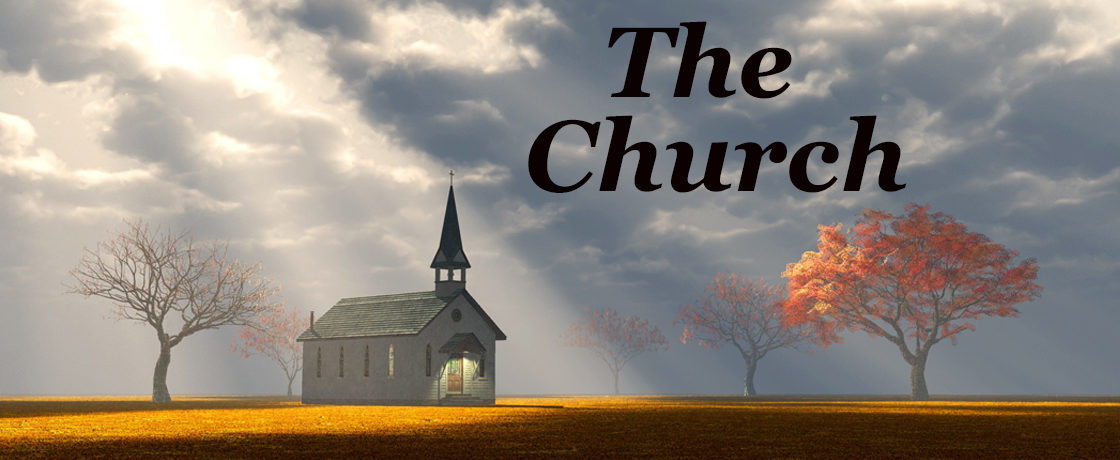The Church
The Church
Acts 1:1 The former treatise have I made, O Theophilus, of all that Jesus began both to do and teach.
The New Testament book of Acts is the only authoritative account that we have of the beginning of the Christian church. The most vital need of the world today is to know exactly what the Christian message is. For that to be realized, we must really understand exactly what the church is also, as the church delivers this message.
Luke shares the message of the church at the very beginning of the book Acts, a message about the Lord Jesus Christ. This is Christianity: “all that Jesus began both to do and teach:” —what He is doing and what He is yet going to do. Jesus our Lord addressed these men, His apostles, and He gave them a commission. This is what throws light on the nature of the church, what she has been commissioned
to do, and how she does it.
What is Christianity? What is the church?
On an individual level, what do we think the church is or what is it supposed to be?
When we approach the scripture and the concept of the church, we approach the sacred text, bringing with us an already established understanding of many issues to which the text speaks. As a result, we do not arrive as impartial observers. Therefore, we are not ready to take up neutral data and integrate it exactly into a coherent and true understanding.
As Christians, we should happily recognize this problem and learn a little humility in our study of the scripture.
We must insist that our ‘non-negotiables’ function this way only until further insight into the teaching of Scripture forces us to change. In this way the Scripture can retain meaningful authority in the believer’s life.
This problem becomes more difficult when a church or a denomination, deeply entrenched in long held patterns, simply refuses to think these things through afresh.
A Course Correction
What we need is a self-conscious dependency upon the Word of God and an equally self-conscious brokenness that hungers for the illumination of the Holy Spirit as we study God’s Word.
Only then will the inevitable influences on our theology, such as long-standing tradition, denominational affiliations, and our cultural and theological heritage, provide creative energies and ask probing questions, instead of usurping the place of control. Only then will the Word of God have the power
to reform our traditions as well as our lives.
Is All This Attention Necessary?
We must constantly define the church in our pluralistic society. Pluralism is a philosophy that allows for a wide diversity of viewpoints and doctrines to co-exist within a single body. It is an attempt to accommodate conflicting viewpoints and keep it peaceful. Peace and unity are wonderful. But they are not the primary value, or only focus. People often strive to keep the church visibly united at all costs. The tragic price tag for that historically has been the loss of meaning and purity in Christ’s church.
A Pluralistic Society
The slogan is correct: “Nobody is leaving anyone else alone and isn’t ever again going to.” The multiplicity of religious claims is here to stay, and everyone will have to deal with it. Consequently, the urgency of thinking afresh about Christ and culture is becoming more necessary. However, the problem is not new!
Christians had to confront a similar mindset during the days of The Roman Empire. In certain important respects, the empire was tolerant: the vast array of religions and customs were not only tolerated, but encouraged. But Christianity’s insistence that Jesus alone was to be worshiped was simultaneously despised and seen as a threat. Then, just like today: strong voices assert that, all consideration of the claims of Christ and God should be banished from the spheres where other gods, called values, reign. The tolerance extends to all but Christianity.
The apostle Paul foresaw such a time, and near the end of his second epistle to Timothy, he gave this advice, “Preach the word; be ready in season and out of season; reprove, rebuke, exhort, with great patience and instruction.” (2 Timothy. 4:2)
There has always been a certain level of pluralism within historic Christianity. The church has always had to deal with heresy, and has always made a distinction between heresy and basic error.
The Message of The Church & Me
What is our personal idea of Christianity and the business, purpose, or focus of the church?
Do we want to just say our prayers and pay our respects to God, before we go out and do what we want? Is Christianity a thing we can take up and use as a minimum threshhold, in the hope that it will somehow put us right? Or is it the most amazing and astounding thing that ever happened or ever will happen?
Is it that by which we live, and long to know and to experience more and more? Do we really realize that this Jesus came into the world to save us from hell, from the punishment that our sins deserve? And to give us the most fulfilling life NOW? Do we realize that the essence of Christianity is what Jesus has done for us and that we must apply it by faith?
Will we discover the Biblical message fully and allow it, God Himself, to guide us?

